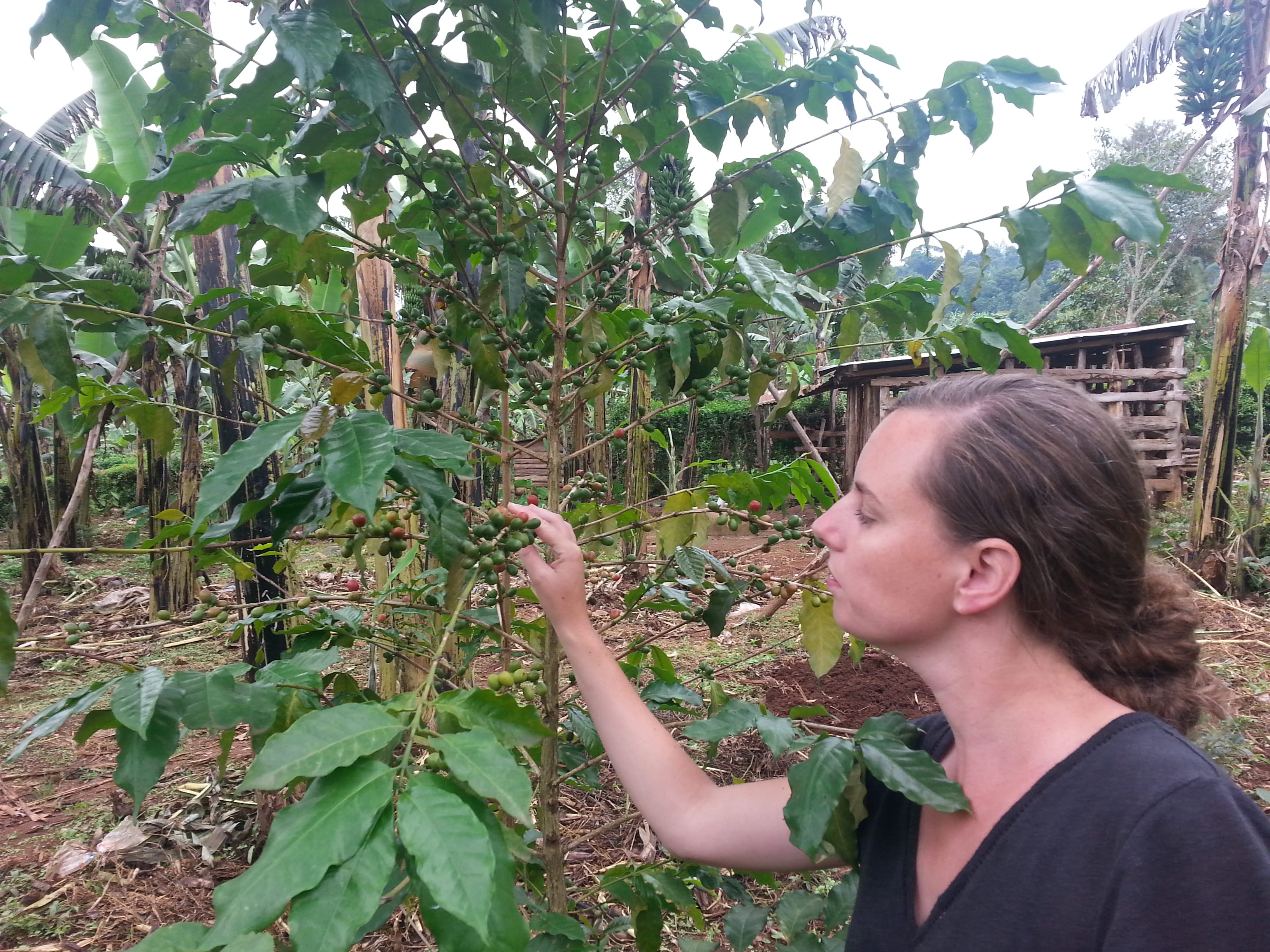Kelly Austin is an Assistant Professor of Sociology at Lehigh. She is in Bududa, Uganda this summer with a group of students pursuing her research in community health. You can see her previous posts here.
One of the key research projects I am working on here is looking at the hidden costs of coffee cultivation in Bududa. In this remote region, coffee is the only product that links Bududa to the international market. So far, I’ve interviewed over 20 coffee farmers, traders, and community leaders. For all but 2 of the interviews, I used Dezz’s assistance to translate and help co-conduct the interview. Sometimes, we walk out into the community and meet the farmers at their coffee garden. They are always very proud to show me their plants. Other times, Dezz organizes the interviews so that the participants come to the Zaale house to be interviewed. This has been the case with all the women I have interviewed, because if I had met them on their property, their husbands would have overseen the interview and I suspect I would have not gotten honest answers.
The gender inequalities with coffee are glaring. One of the key questions I ask is if they think that coffee growing benefits men and women equally in the community. All of the male growers I have interviewed contend that coffee benefits themselves and their wife (or wives) equally. They say they share all the money they get from selling the coffee with their wife or wives, and they use the money together to do things like pay for school fees for the kids, or buy clothes and other needed household items. However, when I asked the women and two community leaders this question, they give me a very different response. The women say that it is them who plant the coffee, maintain and prune the plants, bring

water from the river to coffee gardens that are high in the hills, spend hours and hours harvesting the coffee, and carry the dried coffee beans to the trader; then the men send them home with the empty containers. They never touch the money received from selling the coffee, or even know how much money is made. Many of them contend that their husbands use the money for drinking, feasting, and even to have sex with other women. They are left with nothing – but a backache, or worse. During one interview, one women pointed to her face, displaying a significant scar from below her eye across her cheek. She says, “This is what my husband did to me when I quarreled with him about the money from coffee.”
Another interesting finding relates back to my key interests on malaria. Actually, I have to emphasize that every topic I have ever researched here, including the projects with students that deal with landslides, mental health, privatization of health services, etc., there is always a common theme – malaria. Many of the coffee growers (both men and women) talked about how they get many mosquito bites when they are working or harvesting in their coffee gardens. I press them, and they say that they think there are more mosquitoes in their coffee gardens than in their other gardens. They say this is because the coffee plants need a lot of water, they dig trenches and keep the ground very wet. The locals also say that the mosquitoes like bushes and bushey plants like coffee. I also can’t help but notice that the coffee harvest time, just beginning now and continuing through October, coincides with the wet season exactly. Thus, people are out in their coffee gardens, laboring all day long, from morning through evening picking the cherries when they turn red at the peak of ripeness. All this creates “a perfect storm” to increase the laborers’, who are mainly women and children, vulnerabilities to malaria.
As another interesting finding, most growers have no idea what the coffee they spend so much time cultivating and harvesting is used for, none the less where it goes once they sell it to a trader. A few respondents even commented that they think that maybe the coffee is used to make weapons or bullets.
After each interview I pay my informants 5,000 UGX (Ugandan shillings) for their time. While it is only around $1.75 USD, they are thrilled and so thankful to get what we consider a negligible amount of money. I always tell the women, “don’t tell your husband I gave this to you. You made this money today by talking to me, it is yours.” Many of them hug me, laugh and smile gratefully, and tuck the money quickly away into their skirts or blouses before leaving the Zaale compound.
Overall, my research reveals that coffee farmers here make only 1.5 cents per cup of coffee sold in the United States. Coffee cultivation in Bududa contributes to gender inequalities, spousal abuse, child labor, and malaria prevalence. A lot of the interviews also link coffee cultivation to the felling of large trees on the hillsides and increased incidence of landslides. There was a landslide in Bududa a few months ago that killed 5 people, 4 of whom were young children. Think about all that next time you enjoy a cup of joe.
